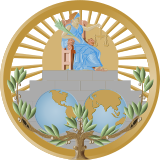Certain Iranian Assets
| Certain Iranian Assets | |
|---|---|
 | |
| Court | International Court of Justice |
| Full case name | Certain Iranian Assets (Islamic Republic of Iran v. United States of America) |
Certain Iranian Assets (Islamic Republic of Iran v. United States of America) is the formal name of a case in the International Court of Justice (ICJ). The application was lodged by Iran against the United States on 14 June 2016, on grounds of violation of Treaty of Amity, Economic Relations and Consular Rights, shortly after Bank Markazi v. Peterson was decided by the United States Supreme Court.[1] The Iranian case seeks the unfreezing and return of nearly $2 billion in assets held in the United States. The case focuses specifically on assets seized from the Iranian national bank, Bank Markazi. These funds were seized to compensate victims of a 1983 suicide bombing of a Marine Corps base in Beirut, Lebanon, which has been tied to Iran. The attack killed more than 300 and injured many more, including U.S. military members. Iran has argued in the case that, among other things, the United States has failed to accord Iran and Iranian state-owned companies, and their property, sovereign immunity, and failed to recognize the juridical separateness of Iranian state-owned companies.[2]
The ICJ rejected most of preliminary objections made by the United States and accepted jurisdiction over the case.[3] On 13 February 2019, out of three United States jurisdictional objections, the ICJ dismissed one, upheld another and postponed another to the merits phase.[4] The United States filed its Counter-Memorial on 14 October 2019. On 15 November 2019, the ICJ authorized the submission of a Reply brief by Iran and a Rejoinder by the United States on 17 August 2020 and 17 May 2021, respectively.[5]
Sitting judges[]
| Name | Nationality | Position | Opinions | ||||
|---|---|---|---|---|---|---|---|
| 1 | 2 | 3 | 4 | 5 | |||
| Abdulqawi Yusuf | President | Majority | Majority | ||||
| Xue Hanqin | Vice President | Majority | Majority | ||||
| Peter Tomka | Judge | Majority | Dissent | ||||
| Ronny Abraham | Judge | Majority | Majority | ||||
| Mohamed Bennouna | Judge | Majority | Majority | ||||
| Antônio Augusto Cançado Trindade | Judge | Majority | Majority | ||||
| Giorgio Gaja | Judge | Majority | Dissent | ||||
| Dalveer Bhandari | Judge | Dissent | Majority | ||||
| Patrick Lipton Robinson | Judge | Dissent | Majority | ||||
| James Crawford | Judge | Majority | Dissent | ||||
| Kirill Gevorgian | Judge | Dissent | Majority | ||||
| Nawaf Salam | Judge | Majority | Majority | ||||
| Yuji Iwasawa | Judge | Majority | Majority | ||||
| Jamshid Momtaz | ad hoc Judge | Dissent | Majority | ||||
| Charles N. Brower | ad hoc Judge | Majority | Dissent | ||||
| Philippe Couvreur | Registrar | N/A | |||||
| a Appointed by Iranian government acting under Article 31§2 of the ICJ Statute. b Appointed by American government acting under Articles 31 and 37§1 of the ICJ Statute. Source: ICJ | |||||||
See also[]
References[]
- ^ Janig, Philipp; Mansour Fallah, Sara (2016), "Certain Iranian Assets: The Limits of Anti-Terrorism Measures in Light of State Immunity and Standards of Treatment", German Yearbook of International Law, 59, SSRN 2993225
- ^ "Certain Iranian Assets (Islamic Republic of Iran v. United States of America)". United States Department of State. Retrieved July 16, 2021.
- ^ Chachko, Elena (February 14, 2019), "Certain Iranian Assets: The International Court of Justice Splits the Difference Between the United States and Iran", Lawfare Institute, retrieved May 11, 2020
- ^ Freehills, Herbert Smith (February 27, 2019), "International Court of Justice allows Iran claim to proceed to the merits phase but upholds jurisdictional objection on sovereign immunity", Lexology, retrieved May 11, 2020
- ^ Press Release, Certain Iranian Assets, 26 November 2019, accessed at https://www.icj-cij.org/public/files/case-related/164/164-20191126-PRE-01-00-EN.pdf
- International Court of Justice cases
- Iran–United States relations
- Iran stubs
- United States law stubs